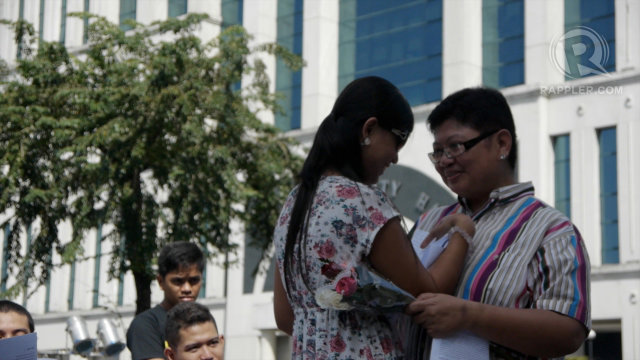SUMMARY
This is AI generated summarization, which may have errors. For context, always refer to the full article.

LGBT groups join the Metro Manila Pride March Saturday. The celebration coincides with Human Rights Consciousness Week and National Lesbian Day. The groups want the government to recognize the importance of LGBT issues. Devon Wong reports.
A choir of children serenade the audience. A minister delivers opening remarks. The blushing lovers are Ivy and Tiffany, exchanging vows in front of the Makati City Hall.
IVY YRAOLA: “We both think it’s about time, that’s why we’re here. Why are you here?” “I just want to be with you that’s why I’m here”
The ceremony is a significant step for the couple, but they know it is far from legal.
IVY YRAOLA: Politics in the Philippines doesn’t make sense. And there’s no one that can really have an advocacy for the LGBT in Manila
On the surface, Filipinos are very tolerant of gay relationships. But this doesn’t translate on paper.
TET GALLARDO, PRIDE MARCH TASK FORCE: I don’t know why there’s a disconnect between the social norms that are very accepting, and the formal regulations that are sort of very strict and rigid.
Supporters of the LGBT community believe it’s time for the government to recognize the importance of LGBT issues.
ZEUS YIAMOUYIANNIS, UNITARIAN UNIVERSALIST CHURCH: There’s an effort here to understand that it’s not just a personal issue. It’s a political issue; it’s a civic issue. It’s a human rights issue. And any time you stand outside a City Hall, you’re saying ‘we are people’.
The Anti Discrimination Bill is still waiting to be passed. Recent amendments now include rights under sexual orientation and gender identity.
But opponents of the bill believe these changes could open the door to same-sex marriage, a shift they claim would jeopardize the country’s deep rooted catholic values.
Pride Marchers are determined make queer identities a part of mainstream Filipino culture.
JIGS MAYUGA, AMNESTY INTERNATIONAL: Other than the fact that you go out to gay clubs and that you talk amongst yourself in cafes, it’s important that people know you’re here and that you’re visible and that you pay taxes and that you want to be here and you wont be discriminated against anymore.
Until the Philippine government shows more commitment to legalizing LGBT rights, Tiffany and Ivy plan to practice their own commitments, symbolically.
Devon Wong, Rappler, Manila
– RAPPLER.COM
Add a comment
How does this make you feel?
There are no comments yet. Add your comment to start the conversation.